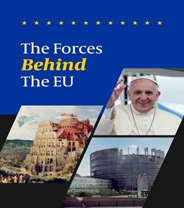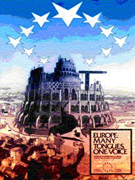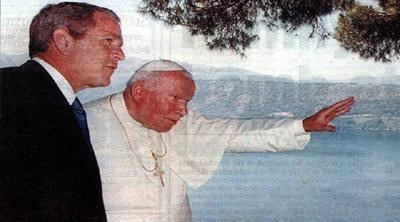


The EU started as a coal and steel union. This union - or plan - being named after Robert Schumann, was called the Schumann Plan. The coal and steel union was gradually turned into a political alliance, which was given the name the European Community (the EC; Article 211-219 TEC). Today we know it as the European Union (the EU). What will its next title be - "the United States of Europe"?
Did you know that prominent Catholic politicians were dominant in the creation of the European Union - for example, the French pro-European strategist Jean Monnet, the French Minister of
Foreign Affairs Robert Schumann, the German Chancellor Konrad Adenauer, the Italian President of Ministers Alcide de Gasperi, etc.? The latter three were also leaders of the Catholic political parties in their respective countries, the Christian Democratic parties.
Lars Bergqvist, the Swedish ambassador to the Vatican, said: "We should note that the EU was founded by devoted Catholics, such as Adenauer (German), Schumann (French) and de Gasperi (Italian). All of them had the union of Europe as an object." (This took place immediately after the Catholic leaders Hitler, Mussolini and Franco had failed in their attempts to do the same.) Taken from the South-Swedish daily the Sydsvenskan, Oct. 16, 1991, under the paragraph titled The Road to the EU Goes Through Rome.
An article in The Sunday Telegraph, of August 25, 1991, bears the title, Now, a Holy European
Empire? Under a large photo of the Pope, it reads: "In him we have the most political pope in modern time." It is quite evident that many are aware of the influence of the Vatican on the European Union.
Catholic leaders have marked the EU. Jacques Delors enjoyed the longest term as leader. He is a Catholic. Note the following information: "The predominant religion of the confederation is Roman Catholicism and its spiritual head is the Pope, to whom all who practice the Roman Catholic religion owe allegiance, political as well as spiritual. Among current leaders of Europe practising this religion are Jacques Delors and Dutch Prime Minister Ruud Lubbers, both Jesuit educated, as well as Chancellor Kohl and Prime Minister Filipe Gonzales of Spain, also devout Roman Catholics. These four leaders are products of the Roman Catholic social movement… The Catholic social movement believes that there is no nobler task than the unifying of our continent. Two internal Commission reports submitted in February 1993 to EU President, Jacques Delors, argue `that ancient religious differences are at the heart of the conflict besetting the Maastricht Treaty on European union; and religion _ or at least some kind of peculiar new Euro-spirituality inspired by Brussels'… The European Community, from its inception, was an idea in the mind of the Vatican to reCatholicise Europe" (Maastricht, Magna Carta, Monarchy & Morality, p. 3, by Michael de Semlyen).
Former retired leaders, Romano Prodi and José Manual Barroso, are also Catholics. The latter is leader of the European Commission. The leader of the European Union today, Herman Van Rompuy, is also a Catholic. He was trained at a Jesuit school, Sint-Jan Berchmans College in Brussels and has also studied philosophy and economics at a Catholic university in Leuven” (The Danish newspaper Kristeligt Dagblad, DK. November 20, 2009). Catholic figures have always dominated the EU. It is interesting to note that José Barroso, among others, has been a visiting professor at the Catholic Jesuit University Georgetown University, where the world leaders are being educated to rule the world after a catholic international pattern. The entire EU system shapes itself according to a Catholic model. The system is laid out in such a manner, that individual nations are obliged to adhere to laws drawn up in Brussels. Those European nations that are subordinated to this Catholic-dominated order, are now being steered by Catholic powers, through a vast set of regulations. This set of regulations ties them both hand and foot.
 Political Influence
Political Influence
What role does the Papacy play on the European political stage? Here are some clear facts - and we will let the Catholics speak for themselves:"Many non-
Catholics fear us as a political organisation, and are afraid that the Catholic Church will
dominate and rule; we are working quietly, seriously and I may say effectively, to that end." (The Catholic magazine The Missionary, June, 1909, p. 69.) This statement is just one of many that shed light on the involvement of the Church in the political world - and that is exactly what we intend to address in this pamphlet. We do not attack the right of the Catholics to believe what they want. We warn against the situation, where the Church shall make use of the powers of the state to enforce a common creed, including economics. The Catholic Church is unlike the other churches, in that it consciously tries to strengthen its position in politics. "The supreme duty of Catholics is to obey the Pope, and seek in every way, and especially by means of the ballot, to render the Catholic policy effective in this country." (Catholic World, Vol. XI, No. 64, 1870.) The Catholic Church commands all its members to participate in the political life to a specific end, like this: "All Catholics must make themselves felt as active elements in the daily political life in the countries where they live. All Catholics should exert their power to cause the constitution of the states to be modelled on the principles of the true church." (Pope Leo XIII, Encyclical Letter of 1890.) The strategy of the Catholic Church is obvious: It wants to gain influence through the parliamentary institutions, in order to control the powers of state. Through political power, it will get religious influence. What will this lead to? What are the lessons of history? Has the Catholic Church changed its attitude?
Reject the National State
The Catholic Church is fighting for a union of church and state. She wants to be universal, and dislikes independent countries ruling themselves according to their own laws. Here we have some statements about this:
The Catholic priest, Phelan, editor of the Catholic journal The Western Watchman, wrote on June 27, 1912: "Tell us that in a conflict between the church and the civil government, we take side of the church. Of course we do. Why, if the government of the United States were at war with the church, we would say tomorrow, TO HELL WITH THE GOVERNMENT OF THE UNITED STATES; if the Church and all the governments of the world were at war, we would say: TO HELL WITH ALL THE GOVERNMENTS OF THE WORLD."
The second statement is from Pope Leo XIII's Encyclical, or shepherd letter, of 1879: "The Church of Rome is one monarchy over all the kingdoms, as the mind and soul of the body of the man, or as God in the world. Therefore, the Church of Rome must not only have the spiritual power, but also the supreme temporal power." Pope Gregory repeated this idea when he said: "The power of the Church is superior to the power of the state." Dr. G. F. van Schulte, professor of Canonical Law at Prague, states: "All human power is from evil and must therefore be standing under the Pope." (T. W. Callaway: Romanism vs. Americanism,
p. 120). These statements makes it crystal clear that this political power is striving to gain power through control over governments and the powers of state.
The Roman Catholic Church is labouring from the idea that is formulated in the Latin expression "de jure divino", meaning that the church has the holy right to rule the whole world, all powers and human beings. It claims to have received this right from God Himself, and it will use all means towards this end - world dominion.
Dr. Bronson, a renowned Catholic authority, wrote: "The pope has the right to pronounce sentence of deposition against any sovereign, when required by the good of the spiritual order… the power of the church exercised over sovereigns in the Middle Ages was not usurpation, was not derived from the concessions of princes or the consent of the people, but was and is held by divine right, and he who resists it, rebels against the king of king and lord of lords." (Catholic Review, June, 1851.)
Even though written long ago, the Church of Rome says that it never changes. We find confirmation of this in one of its own publications: "What the Church has done, what she has expressed or tacitly approved in the past, that is exactly what she will do, express or tacitly approve in the future, if the same circumstances occur." (Catholic Review, Jan., 1854.) It is an advantage to know about the history of the Catholic Church, its strategy and use of power, to understand what is happening and what is about to happen.
Download







